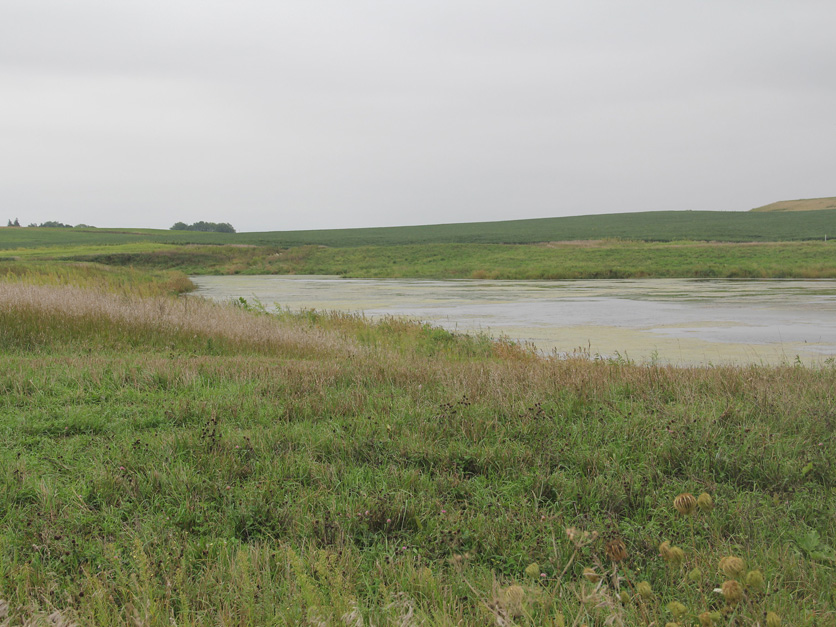The Iowa Supreme Court has rejected a legal effort by environmental groups to force the state to adopt mandatory measures to protect the Raccoon River watershed, the source of drinking water for about a half-million Iowans.
In a 4-3 opinion accompanied by strong dissenting views, the state’s highest court said the plaintiffs, Iowa Citizens for Community Improvement and Food & Water Watch, did not have legal standing to pursue their claims and that their attempt “to repurpose the historically narrow public trust doctrine to solve a complex environmental problem presents a nonjusticiable political question.”
The majority said it was leaving "this dispute where it stands at present: with the branches of our government whose duty it is to represent the public."
Both state and federal courts have rejected efforts over the past several years to force the state to do more to reduce nutrient pollution in the watershed. In 2017, the state Supreme Court ruled drainage districts had immunity under state law to a lawsuit brought by Des Moines Water Works. Also in 2017, a federal judge dismissed DMWW’s Clean Water Act lawsuit for lack of standing.
Justice Edward Mansfield penned the opinion, in which he was joined by Chief Justice Susan Christensen and Justices Thomas Waterman and Matthew McDermott. Justices Brent Appel, Christopher McDonald and Dana Oxley dissented. A Polk County district judge had denied the state’s motion to dismiss the matter, leading to the state’s appeal to the Supreme Court.
The state Supreme Court adopted a test from the U.S. Supreme Court in determining that even if the plaintiffs were to win their case, it would not be enough to establish standing.
“In our view, the attenuated causation theory of the petition is not enough to establish that the plaintiffs’ members have suffered a concrete injury at the hands of the defendants that a favorable court decision is likely to redress,” the court said.
“There is not enough here to demonstrate that a favorable outcome in this case is likely to redress the plaintiffs’ alleged reduced ability to kayak, swim, or enjoy views of the Raccoon River, or would save them money on drinking water,” the majority said.
The plaintiffs said the state’s current voluntary nutrient reduction strategy is not sufficient to address agricultural pollution and sought a court order requiring the adoption of a mandatory plan. They also asked for an order to stop the construction and operation of new and expanding medium and large animal feeding operations and concentrated animal feeding operations in the watershed.
Although not technically at issue in the case, the court also discussed the scope of the public trust doctrine. The majority said, “Historically, in Iowa, the public trust doctrine has not provided an opening for courts to weigh different uses, that is, to second-guess regulatory decisions made by elected bodies.”
“Historically, this doctrine has been applied by our courts in cases seeking to remove private obstructions or interferences,” the court said, noting that those kinds of disputes “are susceptible to judicial resolution using principles of property law.”
But in this case, they said, “the plaintiffs allege … that the public trust doctrine ‘broadly protects the public’s use of navigable waters.’ In other words, the plaintiffs argue that the doctrine imposes a duty on the State to pass laws that regulate those waters in the best interests of the public.”
The court was reluctant to wade that far. “It seems impossible for a court to grant meaningful relief ‘without expressing a lack of the respect due coordinate branches of government,’” it said, quoting one of its previous decisions.
Justice Brent Appel, in dissent, disagreed with the majority’s interpretation of standing. “I would refuse to allow a handwringing application of standing doctrine to throttle environmental litigation law,” he said. “The plaintiffs do not need to show that the requested relief will solve the problem completely but only that it will do some good,” he said.
Interested in more news on farm programs, trade and rural issues? Sign up for a four-week free trial to Agri-Pulse. You’ll receive our content - absolutely free - during the trial period.
He also said he would have found that “the public trust doctrine applies to pollution of navigable waterways in a fashion that prevents or significantly impairs recreational activities and the use of water for drinking purposes.”
And Justice Christopher McDonald said the state “has conceded, for now, the public trust doctrine goes as far as the plaintiffs contend.”
“If private citizens have standing to sue for violations of the public trust doctrine as traditionally understood, … it stands to reason the same private citizens have standing to sue for violations of the public trust doctrine as they seek to expand it,” McDonald said.
A collection of farm groups, including the Iowa Pork Producers Association and Iowa Cattlemen’s Association, joined the state in defending against the suit, along with the Agricultural Legal Defense Fund.
Iowa Farmers Union, Farm Aid, Gulf of Mexico commercial fishermen and the board of trustees of the Des Moines Water Works supported the plaintiffs, and a group of Drake University law professors filed a brief arguing that the public trust doctrine “guarantees to citizens their right to have access to unimpeded use of the state’s waters — not just for transportation, but for use, recreation and enjoyment — not least of which is access to safe drinking water."
For more news, go to www.Agri-Pulse.com.


